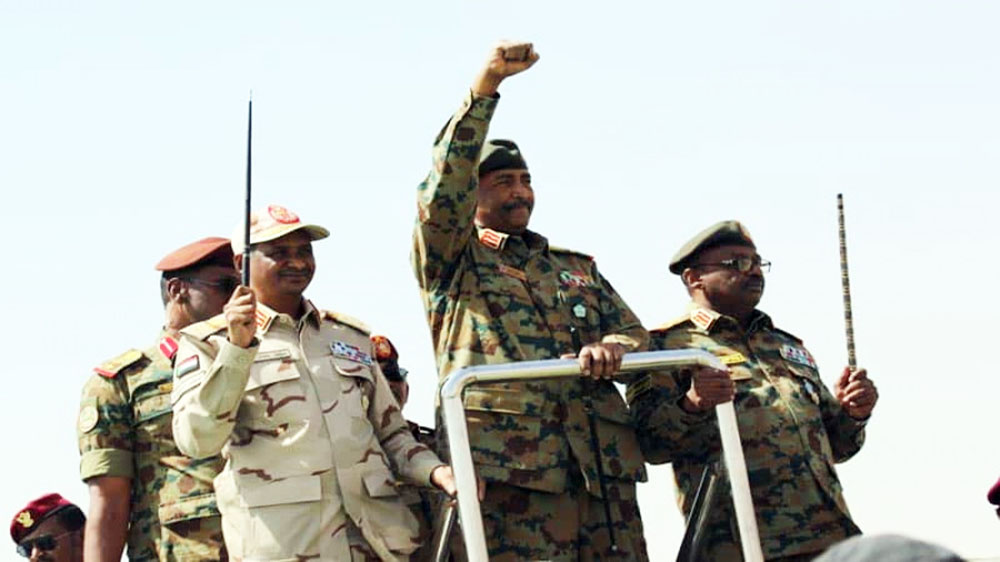
Political leaders fearful of splitting Sudan with two governments
Mashaier Idris
Sudans political and professional forces are afraid to divide the country if the two generals, Abdul Fatah al-Burhan and Mohamed Hamdan Dagalo, fail to end the war and resort to the formation of two governments in the country.
Since he left Burhan, the headquarters of the General Command of the Armed Forces in Khartoum last month, he has been based in Port Sudan, the capital of Red Sea State, in the exercise of his functions in the Sovereign Council and the command of the army, and most of the federal Governments institutions are operating from the coastal city.
While the commander of the RSF, Mohamed Hamdan Dagalo, threatened last Thursday to declare an independent authority with Khartoum as its capital, the army chief announced the formation of a government from Port Sudan, eastern Sudan, accusing the commander-in-chief of the armed forces, Abdel Fattah al-Burhan, of leading a scheme to divide the Sudan.
The Commander of the Forces for Freedom and Change, Sharif Mohammed Osman, considered the step of forming two governments in Port Sudan and Khartoum very dangerous, especially as the priority now is to stop the war.
At the Sudan Political Conference, Sharif Mohamed Osman said those steps were not in favour of the unity of the Sudan and the safety of its people and land, but were inevitably leading to the division of the country and the expansion of the war.
He added: The model of establishing de facto governments in the areas of control in Libya and Yemen is compelling evidence of the seriousness of this move once it occurs in the Sudan.
The current urgent step was to explore ways of stopping the war, restoring peace and stability to the Sudanese people, and not deepening the crisis and causing threats to Sudans unity and soil.
Suleiman Sandals Justice and Equality Movement unequivocally rejected the unilateral formation of any Sudanese government before reaching a comprehensive political agreement in terms of parties and themes that would determine the form of government.
The JEM leader, Djibril Adam Bilal, said, on the basis of the recommendations of the Democratic Bloc Group at the Asmara meetings and their call for the formation of a transitional government under a sovereign council headed by the army, this claim means the unilateral formation of a government with Port Sudan as its capital.
With this premise, it is not unlikely that the other side will seek to form another government in Khartoum, which would lead to the division of the country” He added.
For our part, in JEM, we categorically reject the formation of any Government before the cessation of war and the signing of a comprehensive political settlement. He called on the parties to the war to return immediately to the Jeddah negotiating platform to sign a permanent ceasefire ending the war.
Since last week, Sudanese national forces have held meetings in Eritrea to find solutions to end the war in the Sudan, bringing together representatives of the democratic bloc, the National Movement Forces, the National Umma Party, civil society organizations, professional entities and a number of national figures.
The Asmara Declaration provided for a two-year transitional period, the highest of which was a sovereign council of 5 civilians and 4 military personnel representing the countrys territories, with the sovereign council once again headed by the Commander-in-Chief of the Army. This is similar to the situation on which Prohan turned on October 25, 2021.
The Justice and Equality Movement, led by Gibril Ibrahim, sees the principle of establishing a Government for the conduct of business and the functioning of the States daily workflow as an important and urgent issue to counter the catastrophic effects of war and also to move out of the tunnel of the Sudanese State.
The movements official spokesman, Hassan Ibrahim Fazal, said: I think there is no reason to reject this unless it is for narrow bidding.
He criticized the talk and the threats of a parallel Government once a Government had been formed to conduct business. He said that this was not a deliberately upright conversation. We agreed or disagreed with the armys leadership. Its leader was the official Sudanese State and its symbol of sovereignty.
Regrettably, political forces have not benefited from their disappointments over the past four years, nor have they been displaced by their misperception, as they are still captive to proven theses, perhaps one of the levers of this war.
He stressed that the only way out was to take a new approach that humbled everyone, agreeing on programmes on how to govern the Sudan, and conducting an inclusive Sudanese-Sudanese dialogue that did not exclude anyone from the tunnel.
Any talk or perception that divides the people into a revolutionary ladder, such as the forces of the revolution and the forces of transition, and that absurdity that has given us this resource cannot be a solution.
The Sudan is a diverse country and its stability lies in the assimilation of all the nations mosaics into its administration without exclusion or guardianship.

